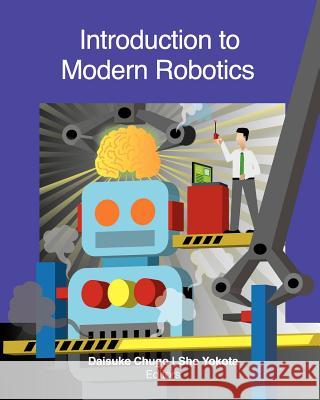Introduction to Modern Robotics » książka
Introduction to Modern Robotics
ISBN-13: 9781463789428 / Angielski / Miękka / 2012 / 364 str.
Introduction to Modern Robotics provides a practical guide about designing, building and programming a modern robotics system. It presents a collection of wide range research results from the robotics community. Chapter 1 presents the development of a connected crawler robot for rough terrain. It specifically focuses on the number of crawler stages should be connected. Chapter 2 shows the design and development process of a humanoid robotic platform that combines power efficiency with flexible and robust motion (such as balancing the need for human-like walking capabilities) without complex computation. Chapter 3 proposes a developmental model for the acquisition of motion in an infant robot by using oscillators. Chapter 4 presents an innovative concept of artificial communication partners with a multi-agent mind model in order for realization of intuitive human-robot interaction. Chapter 5 describes an approach for a robot to self-recognize his/her image on a mirror, an important milestone towards implementing theory of mind on a humanoid robot. Chapter 6 outlines relationships between robotics and software engineering, motivates and illustrates the link between component based software engineering and a service-oriented robotic component model. Chapter 7 explores both the management and the technical aspect of a modern robotic team in the platform of a robot cup competition. Chapter 8 focuses on the methods for evolving a cooperative team for a minimal soccer game by conducting a comparative evaluation of 18 methods, and shows that there are complex correlations among design decisions. Chapter 9 introduces a new coordinative control system for multi-robot system through network software platform. Chapter 10 studies Social Odometry, a new approach to multi-robot localization based on local communication, which confers the robots the possibility to learn from each other. Chapter 11 concerns with the motion coordination of a multi-robot system over a planar cluttered space. Chapter 12 introduces evolutionary-based design of controllers for continuous-time processes, drives and robots. Chapter 13 shows how GA can be used to solve the interception and rendezvous problems without placing a restriction on the chasers speed, which is contradictory to the line-of-sight approach where the speed of the chaser must always be greater than the speed of the target. Chapter 14 explores and extends the application of simulation technique as a proactive risk management tool in infrastructure planning, design and optimisation. Chapter 15 describes a system exploiting complementary data for mined area reduction. It highlights the importance of adapted modeling and of information fusion, and proposes efficient methods based on belief function and fuzzy sets theories. Chapter 16 shows how the warning signals generated using the AR approach reveal the same or better effectiveness as standard visual signals coming from an industrial signaling device that is of commonly used in machinery. Chapter 17 proposes to combine sensory information from infrared and sonar sensors to improve obstacle-avoidance in a Khepera robot. This book is suitable for advanced undergraduate students and postgraduate students. It takes a practical approach rather than a conceptual approach. It offers a truly reader-friendly way to get to the subject related to the semantic web, making it the ideal resources for any student who is new to this subject and providing a definitive guide to anyone in this vibrant and evolving discipline. This book is an invaluable companion for students from their first encounter with the subject to more advanced studies, while the full-color artworks are designed to present the key concepts with simplicity, clarity and consistency.
Zawartość książki może nie spełniać oczekiwań – reklamacje nie obejmują treści, która mogła nie być redakcyjnie ani merytorycznie opracowana.











